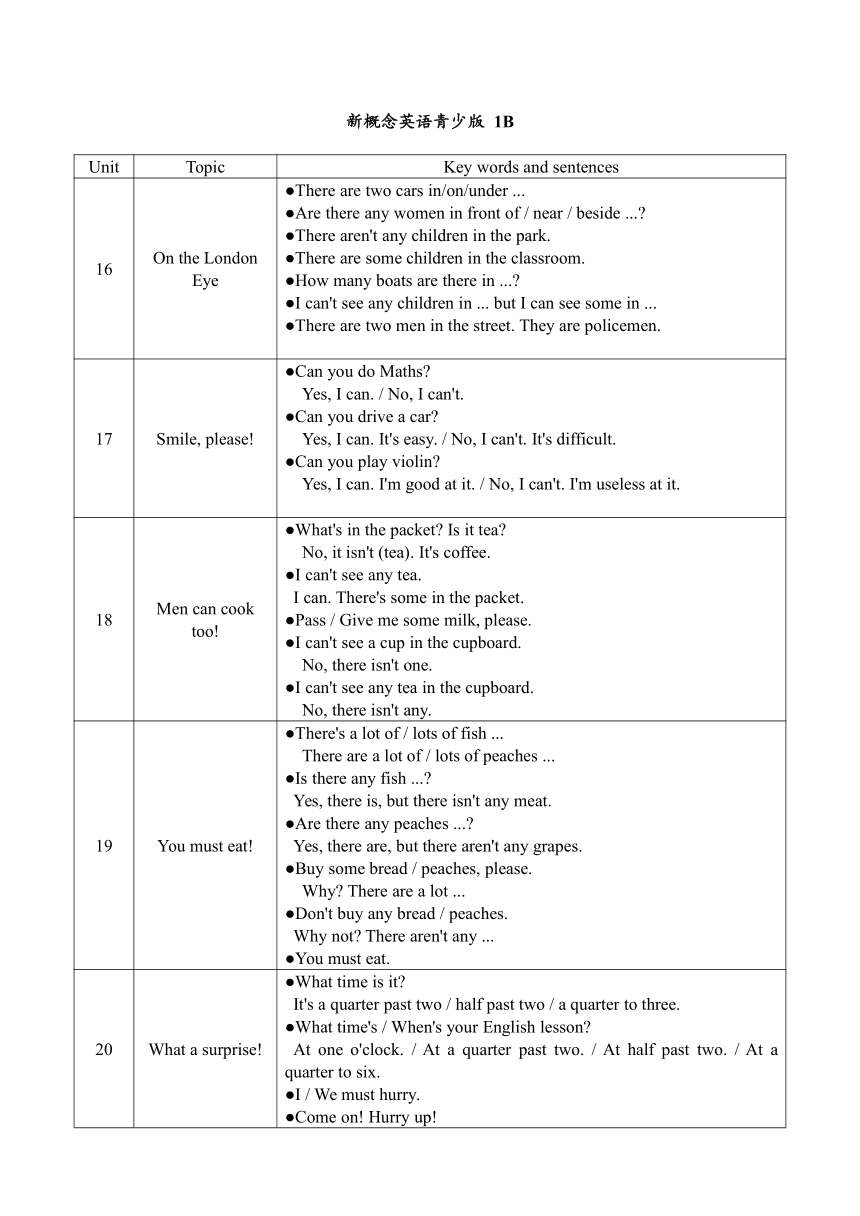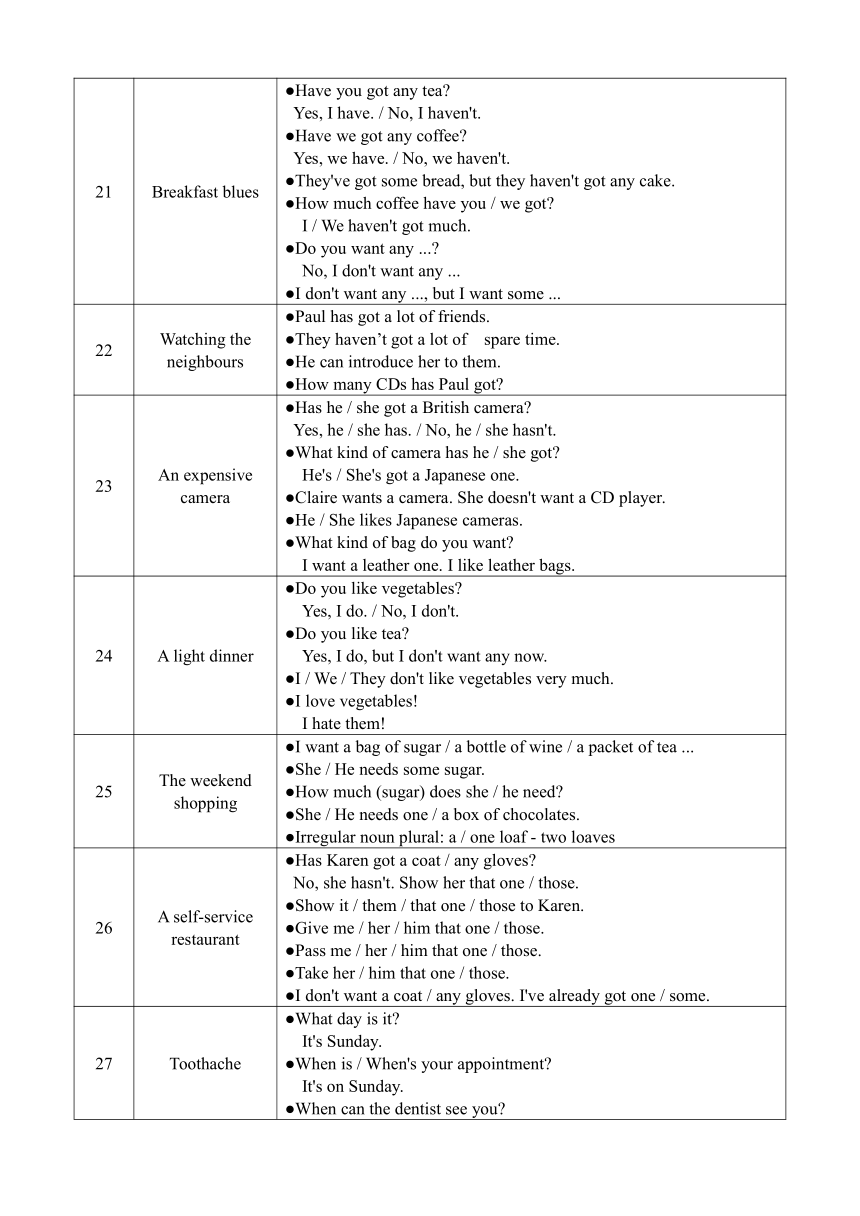新概念英语青少版1B:Unit 16—23 备课教案
文档属性
| 名称 | 新概念英语青少版1B:Unit 16—23 备课教案 |

|
|
| 格式 | rar | ||
| 文件大小 | 58.0KB | ||
| 资源类型 | 教案 | ||
| 版本资源 | 新概念英语 | ||
| 科目 | 英语 | ||
| 更新时间 | 2019-11-12 00:00:00 | ||
图片预览



文档简介
新概念英语青少版 1B
Unit Topic Key words and sentences
16 On the London Eye ●There are two cars in/on/under ... ●Are there any women in front of / near / beside ...? ●There aren't any children in the park. ●There are some children in the classroom. ●How many boats are there in ...? ●I can't see any children in ... but I can see some in ... ●There are two men in the street. They are policemen.
17 Smile, please! ●Can you do Maths? Yes, I can. / No, I can't. ●Can you drive a car? Yes, I can. It's easy. / No, I can't. It's difficult. ●Can you play violin? Yes, I can. I'm good at it. / No, I can't. I'm useless at it.
18 Men can cook too! ●What's in the packet? Is it tea? No, it isn't (tea). It's coffee. ●I can't see any tea. I can. There's some in the packet. ●Pass / Give me some milk, please. ●I can't see a cup in the cupboard. No, there isn't one. ●I can't see any tea in the cupboard. No, there isn't any.
19 You must eat! ●There's a lot of / lots of fish ... There are a lot of / lots of peaches ... ●Is there any fish ...? Yes, there is, but there isn't any meat. ●Are there any peaches ...? Yes, there are, but there aren't any grapes. ●Buy some bread / peaches, please. Why? There are a lot ... ●Don't buy any bread / peaches. Why not? There aren't any ... ●You must eat.
20 What a surprise! ●What time is it? It's a quarter past two / half past two / a quarter to three. ●What time's / When's your English lesson? At one o'clock. / At a quarter past two. / At half past two. / At a quarter to six. ●I / We must hurry. ●Come on! Hurry up!
21 Breakfast blues ●Have you got any tea? Yes, I have. / No, I haven't. ●Have we got any coffee? Yes, we have. / No, we haven't. ●They've got some bread, but they haven't got any cake. ●How much coffee have you / we got? I / We haven't got much. ●Do you want any ...? No, I don't want any ... ●I don't want any ..., but I want some ...
22 Watching the neighbours ●Paul has got a lot of friends. ●They haven’t got a lot of spare time. ●He can introduce her to them. ●How many CDs has Paul got?
23 An expensive camera ●Has he / she got a British camera? Yes, he / she has. / No, he / she hasn't. ●What kind of camera has he / she got? He's / She's got a Japanese one. ●Claire wants a camera. She doesn't want a CD player. ●He / She likes Japanese cameras. ●What kind of bag do you want? I want a leather one. I like leather bags.
24 A light dinner ●Do you like vegetables? Yes, I do. / No, I don't. ●Do you like tea? Yes, I do, but I don't want any now. ●I / We / They don't like vegetables very much. ●I love vegetables! I hate them!
25 The weekend shopping ●I want a bag of sugar / a bottle of wine / a packet of tea ... ●She / He needs some sugar. ●How much (sugar) does she / he need? ●She / He needs one / a box of chocolates. ●Irregular noun plural: a / one loaf - two loaves
26 A self-service restaurant ●Has Karen got a coat / any gloves? No, she hasn't. Show her that one / those. ●Show it / them / that one / those to Karen. ●Give me / her / him that one / those. ●Pass me / her / him that one / those. ●Take her / him that one / those. ●I don't want a coat / any gloves. I've already got one / some.
27 Toothache ●What day is it? It's Sunday. ●When is / When's your appointment? It's on Sunday. ●When can the dentist see you? He can see me at four o'clock on Sunday. ●How does Robert feel / look? He feels awful. He looks miserable. ●What's the matter with Robert? He has got / He's got toothache."
28 Every day is different! ●What's the weather like in spring / summer / autumn / winter? ●Is it ever fine and warm in spring (in England)? ●It's often/usually/sometimes/always/never fine and warm in spring. ●The sun often shines. / It rains sometimes. / It sometimes snows. ●Which season do you like? I like winter.
29 Many happy returns of the day! ●Which is the first / last month of the year? January / December. ●Which month comes after / comes before January? - February / December. ●What's the date? It's the second of February. / It's February the second. ●When is Linda's birthday? It's in January. It's on the ninth of January / on January the ninth. ●How old is Linda? She's 42. / She's 42 years old.
30 An international event ●Where does he / she come from? He / She comes from Australia. ●Where do they / you come from? They / We / I come from China. ●Where does he / she live? He / She lives in Sydney. ●What language does he / she speak? He / She speaks English.
Unit16:On the London Eye
1:Teaching objectives
复习一般现在时学习Some和any的用法
2:Language focus:
Fun, believe, bridge, really, pass, binoculars, any ,ship
3:Teaching procedure
Part 1:
Greeting: 介绍自己,同时要求学生做自我介绍,内容包括Name, (My name is…or I am…)Age, (I am …years old or I am a girl or a boy of …years old)Gender, Hobbies (I like doing …)等几个方面。
Warm up: I see a little bee, sitting on my knee, looking at the see.(用来学习音标/i:/)
Saying: He knows a lot about the secret thing. But he lets the cat out of the bag today.
Part 2:
讲解课文:先听录音回答问题What can they see on Westminster Bridge?
然后学习生词和短语,重点单词.
最后做详细讲解。
Part3:
根据课文问问题,要求学生回答,P5,对话练习,做P9的选择填空。做P6句型练习。然后两人对练对话,最后再做P8书面练习,按照句型来写句子。
Part4:
语音学习,辅音组/f//v/的学习。
Unit17.Smile, please!
1:Teaching objectives
情态动词can的学习
2:Language focus:
Smile, watch, do ,try, as well, easy, on one’s knees, good at, gymnastics, useless, maths, take a photo, gym
3:Teaching procedure
Part 1:
Greeting:Ask a question: Do you like take photos? Do you usually take photos?
Warm Up: chick, chick, chick, I’m a little chick, sitting on the stick, with my brother Nick.
saying: She is an early bird, she often gets up at 5:30 in the morning.(What’s the meaning of ‘early bird’? Part2:
讲解课文:先听录音回答问题(Who can take a photo of Lucy and Flora?),然后学习生词和短语,最后做详细讲解。
Part3:
根据课文问P13问题,要求学生回答,做P17选择填空。然后做P14句型练习,然后两人对练对话,最后再做p16书面练习,按照句型来写句子。
Part4:
语音学习,同时把语音学习融入到课堂中去。学习后面歌谣London bridge.
Unit18. Men can cook, too!
1:Teaching objectives
学习情态动词must的用法。
2:Language focus:
Cook, dinner, help, water, pan, chop, onion, spoon, get, fork, drawer, hand, wet, you see, open, restaurant, must, jug, dry, sugar, milk
3:Teaching procedure
Part 1:
Greeting: What can you cook?
Warm up: Ted was having bread, happy in his bed. Mum came and said: no bread in the bed.
Saying: He has a big name in the football world.
Part2:
讲解课文:先听录音回答问题What can Robert and William open? 然后学习生词和短语,最后做详细讲解。
Part3:
根据课文P21问问题,要求学生回答,做p25选择填空。做P22句型练习,然后两人对练对话,最后再做P44书面练习,按照句型来写句子。
Part4:
鼻音:/m/,/n/
Unit19. You must eat!
1:Teaching objectives
情态动词must的用法,以及名词复数的学习。
2:Language focus:
Eat, finish, why, tired , problem, lots of , fish ,salad, dish , drink, peach
3:Teaching procedure
Part 1:
Greeting: What is your favorite food?
Warm up:学习/?/的发音:
- What’s that, Sam?
-It’s a black bag.
-What’s under the bag?
-Oh, it’s a fat cat.
Saying: It’s a piece of cake for me. I can do it easily.
Part 2:
讲解课文:先听录音回答问题Who can eat lots of peacher?
后学习生词和短语,并做课文详细讲解。
Part3:
根据课文P29问题,要求学生回答,做p33填空。做P30练习,然后两人对练对话,最后再做P32练习,按照句型来写句子。
Part4:
语音学习,同时把语音学习融入到课堂中去。
Unit 20: What a surprise!
1:Teaching objectives
继续学习情态动词must的用法,复习时间表达方法。
2:Language focus:
Surprise, lesson, half past, talk, a quarter, find, bye, when? Look for
3:Teaching procedure
Part 1:
Greeting: What’s the time now? What do you usually do at this time?
Warm up:小游戏:hour hand and minute hand
Part 2:
讲解课文:先听录音回答问题Where is Lucy’s music book?
后学习生词和短语,并做课文详细讲解。
Part3:
根据课文P34问题,要求学生回答,做p41填空。做P37练习,然后两人对练对话,最后再做P38练习,按照句型来写句子。
Part4:
语音学习,同时把语音学习融入到课堂中去。
Unit21: Breakfast blues
1: Teaching objectives
掌握much的意义,会用how much 来造句。以及了解have got的用法。
2:Language focus:
Breakfast blues, want, something, train, stomach, have got, pot, start, morning, yoghurt, canteen,
3:Teaching procedure
Part 1:
Greeting: Do you like eating breakfast every day? What do you usually eat?
Part 2:
讲解课文:先听录音回答问题Is the food at the academy good?
后学习生词和短语,并做课文详细讲解。
Part3:
根据课文P45问题,要求学生回答,做p49填空。做P45互相提问,然后两人对练对话,最后再做P46练习,按照句型来写句子。
Part4:
语音学习,同时把语音学习融入到课堂中去。
Unit 22: Watching the neighbours
1: Teaching objectives
复习名词单复数和have got,学习how many
2:Language focus:
A lot of, shy many, introduce, to, studies, true, always,
3:Teaching procedure
Part 1:
Greeting: Do you like your neighbours?
Warm up: Fliegen klatschen
Part 2:
讲解课文:先听录音回答问题Who’s always busy?
后学习生词和短语,并做课文详细讲解。
Part3:
根据课文P53问题,要求学生回答,做p57填空。做P53互相提问,然后两人对练对话,最后再做P56练习,按照句型来写句子。
Part4:
语音学习,同时把语音学习融入到课堂中去。
Unit 23 An expensive camera
1: Teaching objectives
复习have got,时态:一般现在时,学习国家
2:Language focus:
Kind, let me think, Japanese, remember, another, birthday, at any time
3:Teaching procedure
Part 1:
Greeting: let’s talk something about taking photos.
Warm up: Fliegen klatschen复习之前单词
Part 2:
讲解课文:先听录音回答问题who wants Daisy’s old camera?
后学习生词和短语,并做课文详细讲解。
Part3:
根据课文P61问题,要求学生回答,做p65填空。做P62互相提问,然后两人对练对话,最后再做P62练习,按照句型来写句子。
Part4:
语音学习,同时把语音学习融入到课堂中去。
同课章节目录
- Unit 16 On the London Eye
- Unit 17 Smile,please!
- Unit 18 Men can cook,too!
- Unit 19 You must eat!
- Unit 20 What a surprise!
- Unit 21 Breakfast blues
- Unit 22 Watching the neighbours
- Unit 23 An expensive camera
- Unit 24 A light dinne
- Unit 25 The weekend shopping
- Unit 26 A self-service restaurant
- Unit 27 Toothache
- Unit 28 Every day is different!
- Unit 29 Many happy returns of the day!
- Unit 30 An internation event
